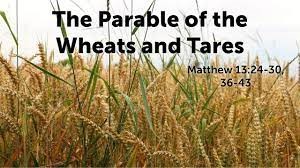Message for Pentecost 8 2023 – July 23, 2023
My Dear Brothers & Sisters,
I share with you from a book called the gospel readings by Father Kenneth O’Sullivan.
Today’s gospel reading from Matthew is about the parable of the Wheat and the Weeds. The lesson is that in the kingdom of Christ on earth, his Church, there will always be sinners and scandal-givers who will make the Christian life more difficult for Christ’s sincere followers. The weeds were among the wheat from the very beginning; one of the twelve, Judas, was a traitor and betrayed our lord for thirty pieces of silver. The Judaizers, half-converted jews, caused severe disturbances among St. Paul’s Gentile Christians. Heresies troubled the first four centuries of the Church and schisms and divisions later on became a great scandal to those inside and outside the Church.
This state of affairs was foreseen by Christ and is tolerated by God for his own wise purposes. Today’s parable is Christ’s answer to the question so frequently asked: “Why does God permit evil to triumph so often in this world, why are the wicked allowed to prosper?” the triumph of the wicked is short-lived, the reward of the Christian who suffers from their wickedness is everlasting. The very wickedness and injustices of evil doers are one of the ways that God uses to perfect his elect. It is only on a battlefield that a true soldier can be proved.
In the parable, the weed does not destroy the wheat. It only makes it more difficult for the wheat to grow to maturity. So it is with the Christian. No one can take his faith from him, but living up to it is made more difficult by the evil influence and bad example of sinners. If some succumb to this evil influence and give up the practice of their faith, the fault is theirs. God can force no man to serve him.
The patience of the farmer in letting the weed grow on until harvest time, exemplifies the infinite mercy of God toward sinners. The weed could not change its nature, but the sinner can change his ways and God gives him every chance and every help to do this, up to his last moment of life. No sinner will be excluded from heaven because of the sins he committed but because he did not repent of these sins while he had the opportunity.
We must learn a double lesson of patience from this parable. First, to be patient with those who make our Spiritual progress more difficult for us – they ae actually helping us to be better Christians if we bear with patience the injuries they inflict on us. Secondly, we must try to imitate the patience God shows in his dealings with sinners. While we must not approve of their evil deeds, or their sins, we must still look on them as our brothers and sisters and do all in our power to put them back on the right path. We can do this by good example, and by fervent prayer for their conversion. This is not easy for human nature, but we can be certain that God will give us the necessary grace and strength to subdue our natural weakness and aversion, if we try to act with charity and true brotherly interest toward our erring fellowmen.

